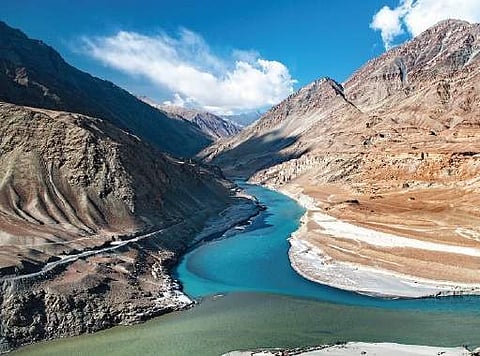

NEW DELHI: India has issued a notice to Pakistan for modification of the Indus Water Treaty (IWT) of September 1960. This notice was sent on January 25th through respective Commissioners for the Indus Waters.
Pakistan has been given a three-month time frame (90 days) to rectify what according to India is the material breach of IWT. This process would also update IWT to incorporate the lessons learned over the last 62 years.
"Pakistan’s intransigence on the Indus Waters Treaty has forced India to issue a notice of modification. India has always been a steadfast supporter and a responsible partner in implementing IWT in letter and spirit. However, Pakistan’s actions have adversely impinged on the provisions of IWT and their implementation, and forced India to issue an appropriate notice for modification of IWT," say sources.
The IWT spells out conditions for water sharing of the Indus and its five tributaries- Sutlej, Beas, Ravi, Jhelum and Chenab.
If one was to take note of the series of events, in 2015, Pakistan requested for an appointment of a Neutral Expert to examine its technical objections to India’s Kishenganga and Ratle Hydro Electric Projects (HEPs). In 2016, Pakistan unilaterally retracted this request and proposed that a Court of Arbitration adjudicate its objections.
"This unilateral action by Pakistan is in contravention of the graded mechanism of dispute settlement envisaged by Article IX of IWT. Accordingly, India made a separate request for the matter to be referred to a Neutral Expert," sources added.
The initiation of two simultaneous processes on the same questions and the potential of their inconsistent or contradictory outcomes created an unprecedented and legally untenable situation, which risked endangering IWT itself. The World Bank acknowledged this in 2016 and took a decision to “pause” the initiation of two parallel processes and request India and Pakistan to seek an amicable way out.
"Despite repeated efforts by India to find a mutually agreeable way forward, Pakistan refused to discuss the issue during the five meetings of the Permanent Indus Commission from 2017 to 2022," sources add.
Meanwhile, at Pakistan’s continuing insistence, the World Bank had initiated actions on both the Neutral Expert and Court of Arbitration processes.
"However, such parallel consideration of the same issues is not covered under any provision of IWT. It was a result of these violations of IWT provisions that India got compelled to issue a notice of modification," say sources.
The objective of the notice for modification is to provide Pakistan with an opportunity to enter into intergovernmental negotiations within 90 days to rectify the material breach of IWT. This process would also update IWT to incorporate the lessons learned over the last 62 years.
BACKGROUND
The Indus Water Treaty (IWT) is a water-distribution treaty between India and Pakistan, arranged and negotiated by the World Bank, to use the water available in the Indus River and its tributaries.[1][2][3][4] It was signed in Karachi on 19 September 1960 by then-Indian Prime Minister Jawaharlal Nehru and then-Pakistani president Ayub Khan.
The Treaty gives control over the waters of the three "eastern rivers" — the Beas, Ravi and Sutlej with a mean annual flow of 41 billion m3 (33 million acre⋅ft) — to India, while control over the waters of the three "western rivers" — the Indus, Chenab and Jhelum with a mean annual flow of 99 billion m3 — to Pakistan.
India has about 20% of the total water carried by the Indus system while Pakistan has 80%. The treaty allows India to use the western river waters for limited irrigation use and unlimited non-consumptive use for such applications as power generation, navigation, floating of property, fish culture, etc. It lays down detailed regulations for India in building projects over the western rivers. The preamble of the treaty recognises the rights and obligations of each country in the optimum use of water from the Indus system in a spirit of goodwill, friendship and cooperation. This has not reduced the Pakistani fears that India could potentially create floods or droughts in Pakistan, especially in times of war.
In 1948, the water rights of the river system were the focus of an Indo-Pakistani water dispute. Since the ratification of the treaty in 1960, India and Pakistan have not engaged in any water wars, despite engaging in several military conflicts. Most disagreements and disputes have been settled via legal procedures, provided for within the framework of the treaty.
Nuts & bolts of the dispute
While Indus, Jhelum and Chenab are for Pakistan under the treaty, India can build hydroelectric power plants subject to design approval
India has already built a hydroelectric power plant on Jhelum and is constructing another on Chenab
In 2015, Pakistan objected to their design and wanted a neutral expert to sort it out. India agreed
A year later, Pakistan sought a court of arbitration instead. It was India’s turn to object, saying two parallel negotiations can’t be allowed under the treaty